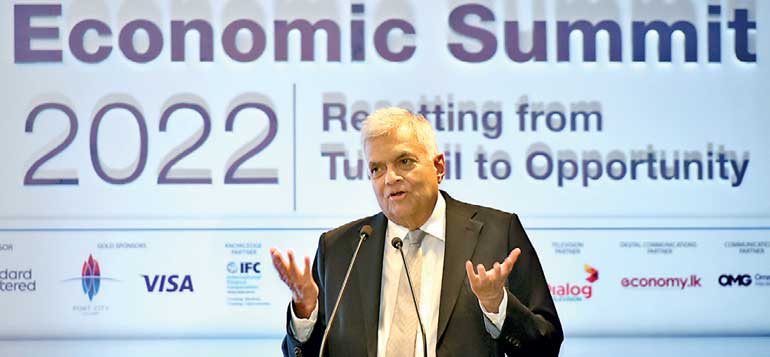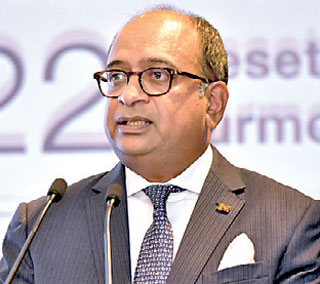Tuesday Feb 17, 2026
Tuesday Feb 17, 2026
Tuesday, 6 December 2022 02:30 - - {{hitsCtrl.values.hits}}

President Ranil Wickremesinghe
By Darshana Abayasingha
 |
| World Bank South Asia Region Vice President Martin Raiser |
 |
| CCC Chairman Vish Govindasamy
|
President Ranil Wickremesinghe posed a challenge to the private sector at the inauguration of the most awaited annual economic event – Sri Lanka Economic Summit last night, and asked if the business community is ready to think outside the box and make sacrifices to achieve growth.
The President said he personally has no plan for reforms nor does the Government, rebuilding similar structures will only lead to the economy coming down again, but much faster.
“We want to build a new economy. An economy that is ready for 2050. Is the private sector ready for it? That’s the only question I have to ask you? Are we going to take up the challenge? Can we take the pain that comes with it, or are we going to hide? Sri Lanka must earn more foreign exchange.
How can we achieve a surplus, if not we cannot survive.”
“Then you have to compete with the world, we have to be highly competitive. Are you ready to take that challenge? We have to build a highly competitive social market economy, it must benefit all not only a few. If you are ready there are many opportunities,” Wickremesinghe said.
The two-day forum will include five sessions during the course of today that include discussions on economic reform, state sector enterprises, sustainable finance in a reset and leadership.
Organised by the Ceylon Chamber of Commerce for the 22nd occasion, this year’s forum is titled ‘Resetting from Turmoil to Opportunity’. Chamber Chairman VishGowindasamy said the Summit fosters a collaborative culture between public and private sectors, encouraging a unified approach toward addressing economic challenges. A collaborative effort from these two sectors is critical at this point to combine resources on a goal for our nation.
Echoing the President’s views, World Bank Vice President South Asia Region Martin Raiser said tariff increases are not pleasant, but are necessary to bring revenues that are currently lacking. In the short-term there is a need for a strong financial sector safety net, and stressed on prioritisation of processes and transparency in communication.
“We have strongly emphasised the importance of increased competition. Sri Lanka is one of five most protected import markets in the world. That’s not a good recipe for being a good exporter. This is what value chains are all about. That level of protection will have to be gradually reduced and a first step is to simplify para-tariffs.
“Sri Lanka has about $ 10 billion in missing trade, when we look at how much Sri Lanka exports, and that’s a lot of jobs that could be created through better competition and I think Mr. President was right. Are you ready for that change? I think the opportunity is there, but it will require adjustment,” Reiser said.
Earlier, the President remarked Sri Lanka was an economy waiting to collapse, as attempts to take the economy in a different direction had proved futile as politicians strove to protect power and businessmen worked to protect profits. Others wanted benefits free of charge, and this was a formula that could not hold.
However, despite the crash, the Government has managed to stabilise the country with its own efforts with help from multilaterals. He added talks with China on debt restructuring had gotten under way following the conclusion of Communist Party Conference, and no major issues have come up thus far and expressed hope it would conclude fast.
“However, we start next year with a big hold of about 400 billion rupees, as that is what the Ceylon Electricity Board will cost us. If you want the Government to fund it then we have to get the printing presses going.
“Are we to adjust the prices and face the consequences? Or, are we to do nothing and hope someone will help us? If we are to go ahead there is only one thing we can do, as there are no options and I presume I will get chastised again for that,” he said, hinting at the rate hikes that have been discussed over the past two weeks.
President Wickremesinghe also spoke on the need to protect local banks and the Small and Medium Enterprise sector, and stressed that small industries cannot be allowed to collapse and must be saved. He acknowledged that both large and small businesses are looking for relief in terms of interest rates to continue business, and said there must be a meeting of minds including the Central Bank on how to handle the economy and see what relied could be granted to the private sector.
He also spoke of the need to modernise agriculture and make maximum use of land hinting at changes to land laws.
Anticipating objections from the chambers and private sector, Wickremesinghe asked if the private sector had in fact make maximum use of the land provided. He also touched on expanding the Colombo Port and the potential lease of the East Container Terminal saying the port will be expanded further up towards Ja-Ela.
CCC Chairman Vish Govindasamy said: “Sri Lanka is at a crucial point in its economic development trajectory. There are difficult decisions to be made, where the steps taken now by the Government and private sector will determine how we emerge from our current challenges. We need to complement the tax reforms with other structural reforms related to trade, investment, cost-recovery pricing and the ease of doing business.
“We must understand that the historical delay in implementing these reforms has led to the current economic crisis. In eliminating corruption, we must make a concerted, honest effort to ensure the rigorous, impartial application of the laws and regulations that have been put in place for this purpose, through strong institutions and processes, for both the public and private sectors.”
Pix by Ruwan Walpola